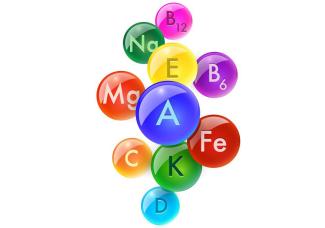
Vitamins are essential organic compounds that our bodies require in small amounts to function properly. They play various roles in maintaining good health and are typically obtained through a balanced diet, as the body often cannot produce them in sufficient quantities. There are several different types of vitamins, which can be categorized into two main groups: water-soluble vitamins and fat-soluble vitamins. Here's a brief overview of the major types of vitamins:
Water-Soluble Vitamins:
- Vitamin C (Ascorbic Acid): Important for immune function, collagen synthesis, and antioxidant protection.
- Vitamin B1 (Thiamine): Helps in energy metabolism and nerve function.
- Vitamin B2 (Riboflavin): Essential for energy production and maintaining healthy skin and eyes.
- Vitamin B3 (Niacin): Plays a role in DNA repair, cell signaling, and metabolism.
- Vitamin B5 (Pantothenic Acid): Involved in the synthesis of fatty acids and coenzyme A.
- Vitamin B6 (Pyridoxine): Required for amino acid metabolism, nerve function, and the formation of red blood cells.
- Vitamin B7 (Biotin): Important for skin, hair, and nail health, as well as fatty acid synthesis.
- Vitamin B9 (Folate or Folic Acid): Essential for DNA synthesis, cell division, and preventing neural tube defects during pregnancy.
- Vitamin B12 (Cobalamin): Necessary for the formation of red blood cells and maintaining nerve function.
Fat-Soluble Vitamins:
- Vitamin A (Retinol): Important for vision, skin health, and immune function.
- Vitamin D (Calciferol): Crucial for calcium absorption, bone health, and immune system regulation.
- Vitamin E (Tocopherol): Acts as an antioxidant, protecting cells from damage.
- Vitamin K (Phylloquinone, Menaquinone): Essential for blood clotting and bone health.
In addition to these essential vitamins, there are other compounds sometimes referred to as "vitamin-like" substances or micronutrients, such as choline and inositol, which play important roles in the body's functions.
It's important to maintain a well-balanced diet to ensure you get an adequate supply of these vitamins. In some cases, dietary supplements may be recommended if you have specific deficiencies, but it's essential to consult with a healthcare professional before taking any supplements, as excessive intake of certain vitamins can be harmful.






